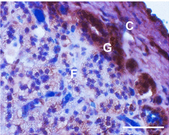
Are diabetes and dengue linked?
As the burden of non-communicable disease in low- and middle-income countries increases alongside a high incidence of infection, it is important to understand the links between the different disease groups in order to monitor and control their prevalence. In recent years, increasing numbers of older people have been affected by dengue – an infection that primarily affected children in the past – suggesting that age-related comorbidities could affect dengue pathogenesis.
Now, a systematic review and meta-analysis has been conducted to evaluate associations between diabetes and dengue severity. Analyzing five case-control studies, the authors showed that diabetes is associated with increased risk for severe dengue infection.
While the authors caution that available evidence is limited, and recommend that further studies are required, these findings indicate a possible link between the two diseases. The results suggest that diabetic patients with fever who live in an area affected by dengue should seek confirmation of dengue infection as soon as possible.
Htun et al., PLOS Neglected Tropical Diseases
New insights into early-onset hypertension

Primary aldosteronism (PA) is a rare hormonal disorder leading to early-onset hypertension. Genetic factors are known to play a role in the development of the condition, but the underlying causes are not completely understood.
Now, a new genetic mutation associated with PA has been identified. The researchers carried out exome sequencing of 40 individuals with PA, and found that five of them shared the same mutation in the CACNA1H gene, which codes for a calcium channel expressed in cells of the adrenal gland.
In functional electrophysiology experiments, the calcium channel bearing the mutation was more likely to be open and took longer to deactivate, resulting in greater aldosterone production in the adrenal gland.
Taken together, these findings provide novel insights into the pathogenesis of PA-associated hypertension, and suggest that calcium channels could represent therapeutic targets for the disease.
Trial registration and primary outcome changes
Clinical trials are the gold-standard method for assessing the effectiveness of new therapies before they can be used routinely in the clinic. Registration of clinical trials is a very important step in the good conduct of such studies. However, previous studies have shown that a substantial amount of trials registered on clinicaltrials.gov have had the primary outcomes changed after registration and completion.
To investigate changes in trial registration further, a cross-sectional analysis of over 13,000 trials registered on clinicaltrials.gov was conducted, in an extension of a 2014 study. It was found that changes to the primary outcome occurring after trial completion are associated with the study reporting a significant result.
Together with other studies, this work emphasizes the need for transparent and accurate trial registry information, and quality control procedures to ensure that trials are reported correctly.
Ramagopalan et al., F1000 Research
Exercise and breast cancer risk: influence of subtype?

It is well-established that physical activity is negatively associated with breast cancer risk, but whether this link is modified by breast cancer subtype is not well-understood.
In an analysis of data from the population-based Women’s Contraceptive and Reproductive Experiences Study, researchers from the US and Norway investigated whether the different subtypes of breast cancer – defined by the expression estrogen receptor (ER), progesterone receptor (PR), human epidermal growth factor receptor 2 (HER2), and p53 – have distinct inverse associations with exercise.
Self-reported physical activity was inversely associated with ER-positive and HER2-negative breast cancer, but not with the other subtypes. The authors conclude that exercise reduces the risk of breast cancers that do not express HER2, which provides new insights into the mechanisms linking exercise and breast cancer risk.
Managing psoriatic arthritis
Psoriatic arthritis is a type of inflammatory arthritis that can occur in those with the skin condition psoriasis. A number of clinical guidelines for managing the condition exist, but the evidence base for using disease-modifying agents for the treatment of psoriatic arthritis is unclear.
To address this gap, a systematic review of randomized controlled trials looking at the effect of synthetic drugs or biologics has been conducted. The endpoint in these trials was improved musculoskeletal outcomes in psoriatic arthritis. 28 trials were included in the final analysis, showing that conventional agents methotrexate, ciclosporin and sulfasalazine do not improve outcomes, but leflunomide showed a small positive effect.
Newer synthetic disease-modifying agents – including apremilast and various monoclonal antibodies – showed some benefit, but the authors caution that limited evidence is available for newer agents.

The results of this systematic review suggest that conventional disease-modifying agents do not have a clear benefit for treating psoriatic arthritis, but newer biologic agents could be more effective. The authors recommend that it may be necessary to review guidelines for the management of psoriatic arthritis, highlighting that treatment strategies used for rheumatoid arthritis are not necessarily effective therapies for psoriatic arthritis.
great post, good stuff, i enjoyed reading it thoroughly.
thanks for sharing your valuable insight with us. I appreciate your approach and the idea you shared with the users.